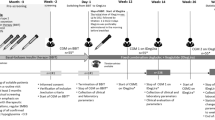Abstract
Objective and design
This post-marketing surveillance study collected data on the efficacy and tolerability of acarbose in patients with insulin-treated type 2 diabetes mellitus and, in particular, on its effect on postprandial blood glucose under normal daily practice conditions.
Patients and methods
A total of 1142 patients were included in this observational study in which the treating physicians had sole responsibility for determining acarbose doses and other therapeutic measures. Efficacy parameters consisted of fasting and postprandial blood glucose and glycosylated haemoglobin (HbA1c). Additionally, cholesterol, triglycerides and weight were analysed. All patient data had to be recorded by the attending physician on a case report form. Patients were asked to self-monitor blood glucose daily after breakfast (1h) and to keep a diary.
Results
Mean HbA1c improved by 0.9%, fasting blood glucose by 32.4 mg/dL, and postprandial hyperglycaemia by 49.7 mg/dL during the observation period compared with baseline. Comparable results were obtained in combination with conventional, functional or intensive insulin therapy. Mean weight was reduced by 0.7kg. The incidence of acarbose-related side effects was low (6.9%) and consisted mostly of gastrointestinal complaints. The majority of patients assessed acarbose treatment positively.
Conclusion
The addition of acarbose to different insulin regimens provided an efficacious and safe treatment for better glycaemic and weight control.





Similar content being viewed by others
References
Turner RC, Cull CA, Frighi V, et al. Glycemic control with diet, sulfonylurea, metformin, or insulin in patients with type 2 diabetes mellitus: progressive requirement for multiple therapies (UKPDS 49). JAMA 1999; 281: 2005–12
Buse JB. The use of insulin alone and in combination with oral agents in type 2 diabetes. Prim Care 1999; 26: 931–50
Yki-Järvinen H. Combination therapies with insulin in type 2 diabetes. Diabetes Care 2001; 24: 758–67
Hanefeld M, Fischer S, Julius U, et al. Risk factors for myocardial infarction and death in newly detected NIDDM: the Diabetes Intervention Study, 11-year follow-up. Diabetologia 1996; 39: 1577–83
The DECODE Study Group. Glucose tolerance and cardiovascular mortality: comparison of fasting and 2-hour diagnostic criteria. Arch Intern Med 2001; 161: 397–404
Temelkova-Kurktschiev TS, Koehler C, Henkel E, et al. Post-challenge plasma glucose and glycemic spikes are more strongly associated with atherosclerosis than fasting glucose or HbA1c level. Diabetes Care 2000; 23: 1830–4
Haller H. The clinical importance of postprandial glucose. Diabetes Res Clin Pract 1998; 40 Suppl. : S43–9
Ceriello A. The post-prandial state and cardiovascular disease: relevance to diabetes mellitus. Diabetes Metab Res Rev 2000; 16: 125–32
Del Prato S. Post-prandial hyperglycaemia: the necessity for better control. Int J Clin Pract Suppl 2000; 112: 3–8
Hanefeld M. Post-prandial hyperglycaemia and vascular disease. Int J Clin Pract Suppl 2000; 112: 13–8
Tuomilehto J, Del Prato S. Mealtime glucose regulation in type 2 diabetes. Int J Clin Pract 2001; 55: 380–3
Duckworth WC. Hyperglycemia and cardiovascular disease. Curr Atheroscler Rep 2001; 3: 383–91
Hanefeld M. The role of acarbose in the treatment of non-insulin-dependent diabetes mellitus. J Diabetes Complications 1998; 12: 228–37
Chiasson JL, Josse RG, Gomis R, et al. Acarbose for prevention of type 2 diabetes mellitus: the STOP-NIDDM randomised trial. Lancet 2002; 359: 2072–7
Chiasson JL, Josse RG, Gomis R, et al. Acarbose treatment and the risk of cardiovascular disease and hypertension in patients with impaired glucose tolerance: the STOP-NIDDM trial. JAMA 2003; 290(4): 486–94
Chiasson JL, Josse RG, Hunt JA, et al. The efficacy of acarbose in the treatment of patients with non-insulin-dependent diabetes mellitus: a multicenter controlled clinical trial. Ann Intern Med 1994; 121: 928–35
Coniff RF, Shapiro JA, Seaton TB, et al. A double-blind placebo-controlled trial evaluating the safety and efficacy of acarbose for the treatment of patients with insulin-requiring type II diabetes. Diabetes Care 1995; 18: 928–32
Kelley DE, Bidot P, Freedman Z, et al. Efficacy and safety of acarbose in insulin-treated patients with type 2 diabetes. Diabetes Care 1998; 21: 2056–61
Spengler M, Cagatay M. The use of acarbose in the primary-care setting: evaluation of efficacy and tolerability of acarbose by postmarketing surveillance study. Clin Invest Med 1995; 18: 325–31
Mertes G. Safety and efficacy of acarbose in the treatment of type 2 diabetes: data from a 5-year surveillance study. Diabetes Res Clin Pract 2001; 52: 193–204
Vijan S, Kent DM, Hayward RA. Are randomized controlled trials sufficient evidence to guide clinical practice in Type II (non-insulin-dependent) diabetes mellitus? Diabetologia 2000; 43: 125–30
Lebovitz HE. α-Glucosidase inhibitors as agents in the treatment of diabetes. Diabetes Rev 1998; 6: 132–45
Acknowledgements
The concept of this post-marketing surveillance study was developed and funded by Bayer Vital GmbH, Leverkusen, Germany. Statistical analyses were performed by the Institute KFM, Munich. We would like to thank all the physicians who participated in this surveillance study for their excellent cooperation.
Author information
Authors and Affiliations
Corresponding author
Rights and permissions
About this article
Cite this article
Klocke, K.R., Stauch, K. & Landen, H. Effect of Add-On Acarbose to Insulin Therapy in Routine Clinical Practice. Clin. Drug Investig. 23, 621–627 (2003). https://doi.org/10.2165/00044011-200323100-00001
Published:
Issue Date:
DOI: https://doi.org/10.2165/00044011-200323100-00001




